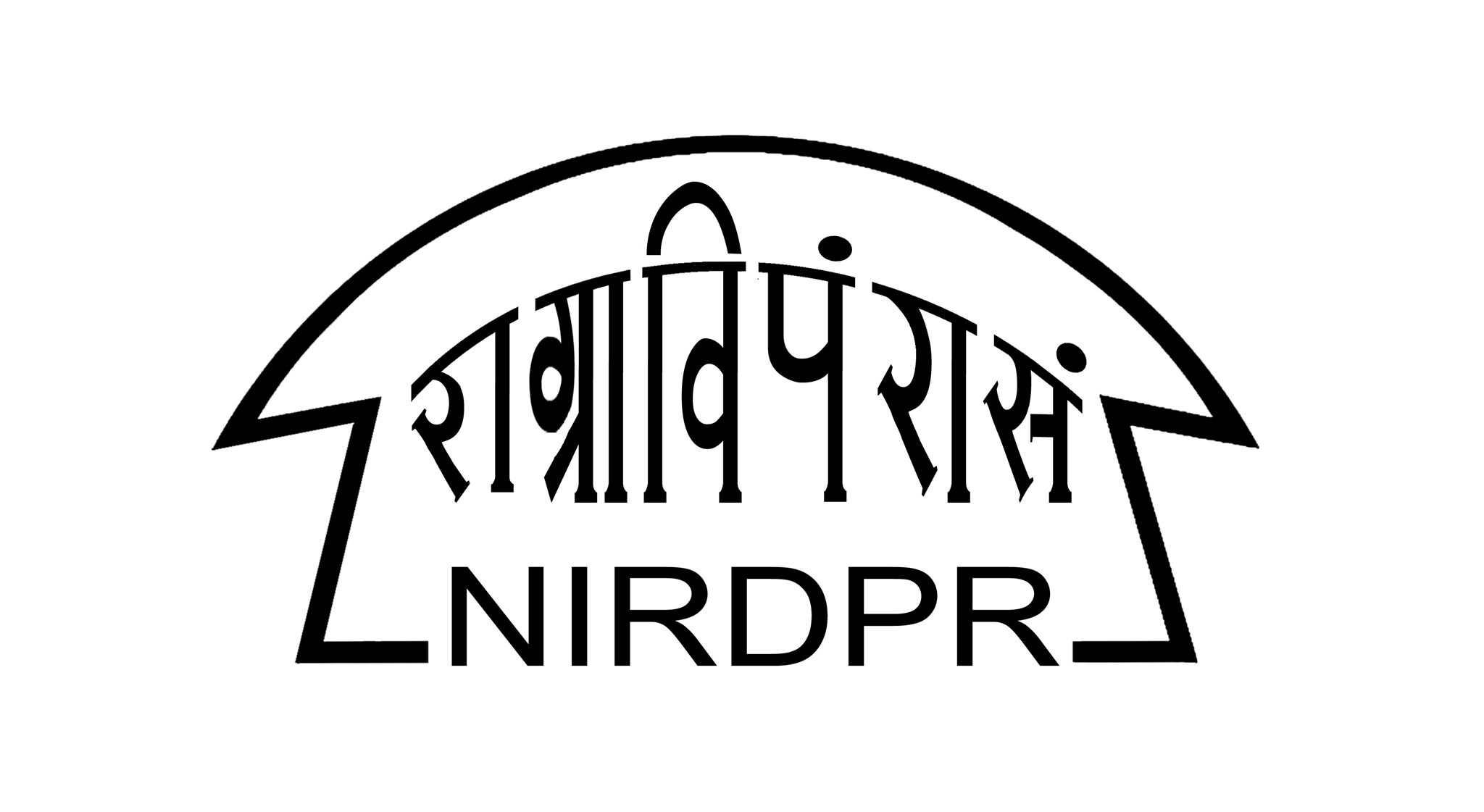
CONTENTS:
COVER STORY: World Day of Social Justice: Overcoming Barriers and Unleashing Opportunities for Social Justice
NIRDPR Organises Eminent Lecture Series- 2023
ToT Programme on Entrepreneurship & Sustainable Livelihood Models for Rural Communities
ToT Programme on GIS-based Planning and Monitoring of MGNREGA Works at GP Level Using Yuktdhara
National Workshop on Development of A Framework for Linking Corporates to Strengthen SHG-led Entrepreneurship Development
ToT on Capacity Building programme on e-GramSwaraj Portal for PRI Functionaries
Capacity building on Millet Marketing at SARAS Mela by NIRDPR
CDC Organises a Two-day Book Fair
COVER STORY:
World Day of Social Justice: Overcoming Barriers and Unleashing Opportunities for Social Justice
Social justice is the concept of fair and equitable distribution of resources, opportunities, and rights in society. Historically, the idea of social justice is that all people should have equal access to wealth, health, well-being, justice, privileges, and opportunity regardless of their legal, political, economic, or other circumstances. In modern practice, social justice revolves around favouring or punishing different groups of the population, regardless of any given individual’s choices or actions, based on value judgments regarding historical events, current conditions, and group relations. In economic terms, this often means redistribution of wealth, income, and economic opportunities from groups whom social justice advocates consider to be oppressors and to those whom they consider being oppressed. Social justice is often associated with identity politics, socialism, and revolutionary communism.
There are many concerns of social justice specific to regions and countries but for South Asia and India, the most visible concerns are social exclusion based on untouchability, caste, and gender discrimination that stand as the biggest hindrance on the path of access to equal opportunities in social life. The word ‘social justice’ is mentioned in the Preamble of the Indian Constitution and very often, it is interpreted by the Supreme Court in a different context, expanding the connotation to a very larger view of justice as an integral part of political and economic justice. Social justice is recognised as the basic structure of the Indian Constitution.
India’s Constitution has also solemnly guaranteed all its people social, economic, and political justice; freedom of expression of speech, belief, religion, and worship; equality of status and opportunity; and the promotion of the dignity of the person and the unity of the community among all the fraternity. Articles 23 and 24 provide for fundamental rights against exploitation. Article 24, in particular, prohibits an employer from employing a child below the age of 14 years in any factory or mine or in any other hazardous employment. Article 31 makes a specific provision with regard to the fundamental right to property and deals with the vexed problem of compulsory acquisition of property. Article 38 requires that the State should make an effort to promote the welfare of the people by securing and protecting as effectively as it may a social order in which justice social, economic, and political shall inform all the institutions of national life.
The 2023 World Day of Social Justice provides an opportunity to foster dialogue with member States, youth, social partners, civil society, UN organisations, and other stakeholders on actions needed to strengthen the social contract that has been fractured by rising inequalities, conflicts, and weakened institutions that are meant to protect the rights of workers. Despite these multiple crises, there are many opportunities to build a coalition for social justice and to unleash greater investments in decent jobs, with a particular focus on the green, digital, and care economy, and on young people.
Today, majority of the workers have not recovered their pre-pandemic labour incomes and the gender gap in hours worked has continued to grow. Increases in food and commodity prices are disproportionately impacting poor households and small businesses, especially those in the informal economy. Roughly half the world’s population remains without any access to social protection. And in too many places, having a job does not guarantee the ability to escape from poverty. A continued lack of decent work opportunities, insufficient investments in social policy, and overconsumption of natural resources has led to an erosion of trust and a frayed social contract in many countries. Even before the pandemic, there was a growing concern about the adverse effects of high and rising levels of inequality, recognition of the need for urgent and decisive action to reduce them, and ensure more inclusive growth that provides decent work opportunities for all.
Social justice can be pursued through various means, including policy and legislative changes, community organising, advocacy, education, and activism. It requires a commitment to ongoing learning and reflection, and a willingness to challenge systemic barriers and to work towards a more equitable society.
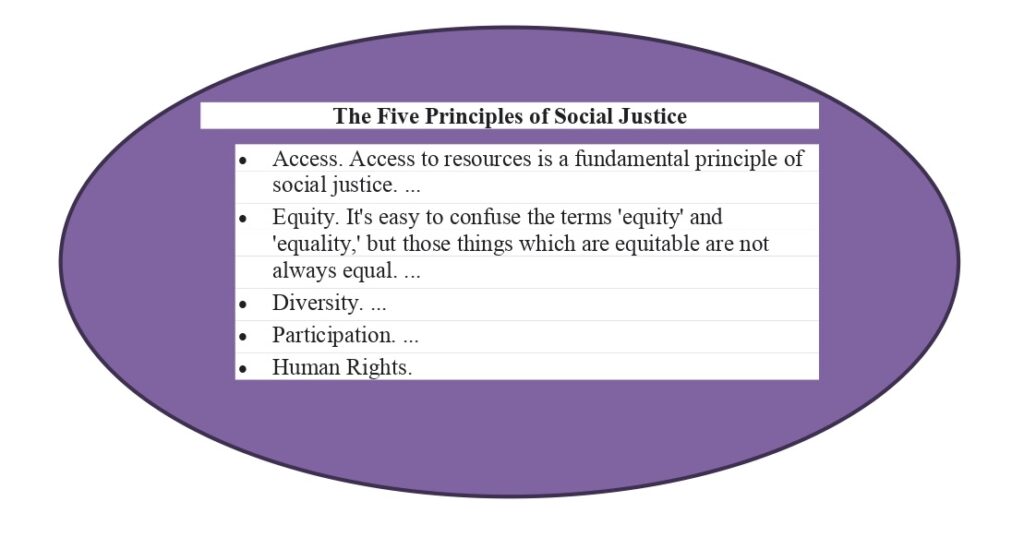
Social justice issues can include a range of concerns, such as poverty, discrimination, inequality, human rights violations, and environmental degradation. These issues can affect individuals and communities in different ways, and social justice seeks to ensure that everyone has equal access to resources and opportunities. Social justice advocates believe that all individuals should have equal rights and opportunities, and that systemic barriers to equal access should be identified and dismantled. It involves advocating for policies and practices that promote fairness and equality in all aspects of society, including education, healthcare, employment, housing, and criminal justice.
Sustainable development and social justice are both widely regarded as desirable goals and there is a growing interest in the degree to which they are compatible. It is becoming more widely recognised that social inequalities are among the causes of environmental degradation. Social justice is broadly about the distribution of benefits and burdens. It includes the values of the equal worth of all citizens, their equal right to be able to meet their basic needs, and the need to spread the opportunities and life chances as widely as possible.
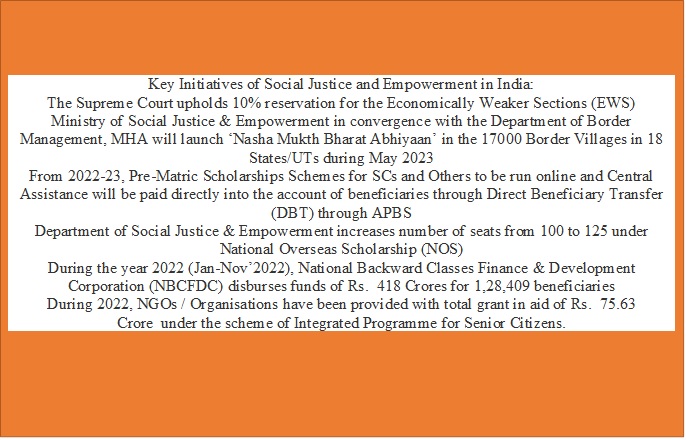
Social justice encompasses a wide range of issues, including poverty, racism, discrimination, inequality, human rights, and access to education, healthcare, and housing. It seeks to promote a society that values diversity and inclusion, and works towards the betterment of all its members, not just a select few.
Efforts towards social justice can take many forms, such as policy changes, legal reform, community organising, and grassroots activism. It is an ongoing process that requires individuals and institutions to recognise and address the underlying causes of inequality and work towards creating a more just and equitable society.
Social justice can take many forms, from promoting policies that provide equal access to education, healthcare, and employment opportunities, to advocating the protection of human rights and the elimination of systemic racism and discrimination. It also involves recognising and addressing the ways in which various forms of oppression intersect and compound each other, such as how race and gender discrimination can disproportionately affect women of colour.
Social justice movements have historically played a crucial role in challenging societal norms and promoting positive change. They continue to be important today as individuals and organisations work to promote equality and justice in all areas of society.
Almost thirty years ago, at the World Summit for Social Development in 1995, global leaders pledged to make the eradication of poverty, the goal of full employment, and social justice overriding objectives of development. The 2030 Agenda also aims to “promote inclusive and sustainable economic growth, employment and decent work for all.” Decent work has increasingly been recognised as the lynchpin of strategies to achieve social justice by linking the social, economic, and environmental components of sustainability.
The World Day of Social Justice on 20th February 2023 provides an opportunity to foster dialogue on actions needed to achieve social justice by strengthening the social contract that has been fractured by rising inequalities, conflicts, and weakened institutions that are meant to uphold and protect the rights of workers.
Dr. T. Vijaya Kumar
Associate Professor
NIRDPR-North Eastern Regional Centre
Guwahati, Assam
NIRDPR Organises Eminent Lecture Series- 2023
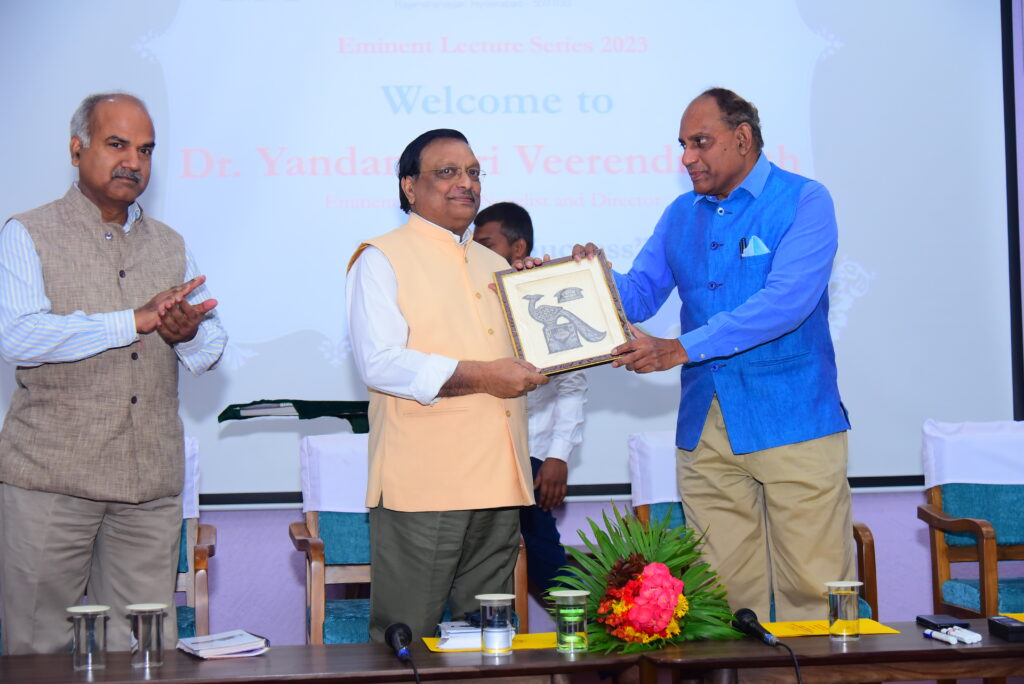
The National Institute of Rural Development and Panchayati Raj organised three sessions in the month of February as part of the Eminent Lecture Series- 2023.
Lecture on Success and Emotional Intelligence
On 13th February 2023, eminent speaker, novelist and director Dr. Yandamuri Veerendranath delivered a lecture on Success and Emotional Intelligence. Dr. G. Narendra Kumar, IAS, Director General, NIRDPR gave the keynote address.
Stating that success and emotional intelligence are important topics for any institution, he recollected the contributions made by Dr. Yandamuri Veerendranath to the world of literature
He said that the Indian economy is growing at a good pace and it had moved from 10th position to 5th position in the last 10 years, which is a highly significant progress.
“We are on the way to becoming the third largest economy. That is how the success of this country is measured; likewise, many factors contribute to the success of an organisation. Earlier, we had set up a performance management division to evaluate the performance of various departments and ministries and came up with a results framework document. While looking at the success indicators, we found that the officials were performing well, but the media were criticising the organisations and government,” he said, highlighting the need for a system to measure the success of the organisation as well as the individuals.
“NIRDPR, being a think tank, deals with people who have been facing poverty and deprived of wealth for generations. To change their mind towards life, we should be equipped and motivated first in matters of success and emotional intelligence,” the DG added.
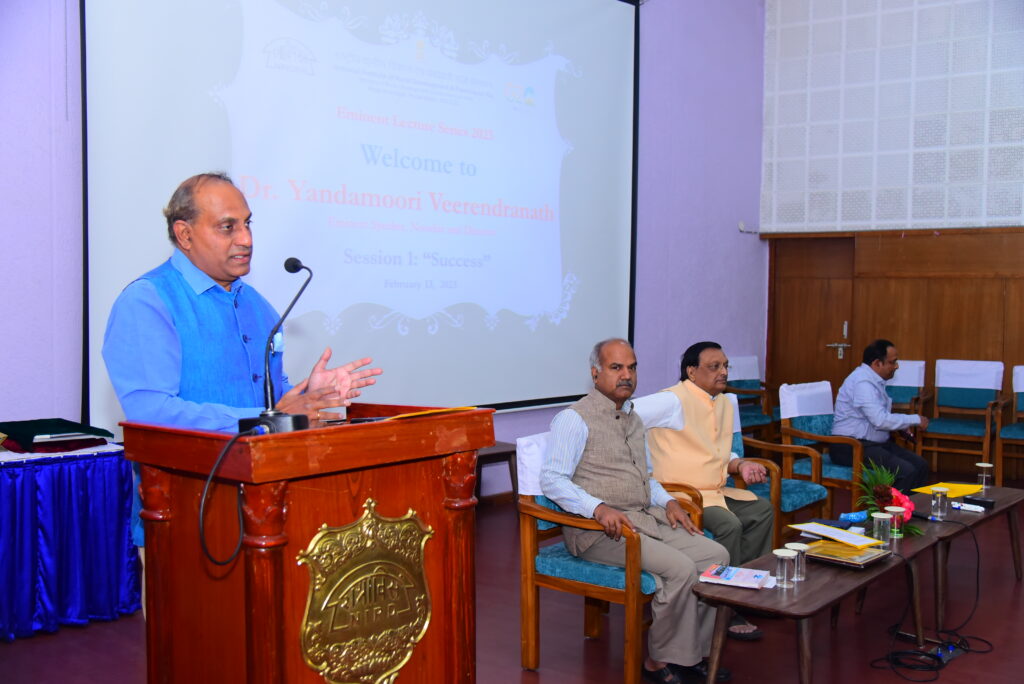
Earlier, Dr. M. Srikanth, Registrar and Director (Admin) delivered the welcome note and Shri Shashi Bhushan, ICAS, Deputy Director General (i/c), NIRDPR, gave the inaugural address.
Dr. Yandamuri Veerendranath divided his lecture into two parts – Session 1 on Success and Session 2 on Emotional Intelligence. He started by explaining the Butterfly effect, which is the change brought by a small incident in one’s life. Further, narrating his personal experiences, he said that success does not mean earning money but dedication and determination.
Dr. Yandamuri Veerendranath further talked about personality differences and explained the features of external and internal personalities. The lecture also had practical sessions and he felicitated participants, who successfully completed the tasks.
On the occasion, the academic and non-academic staff, whose probation has been declared, were felicitated. Shri Manoj Kumar, AR(E), NIRDPR, proposed a vote of thanks.
Lecture on Stress Management
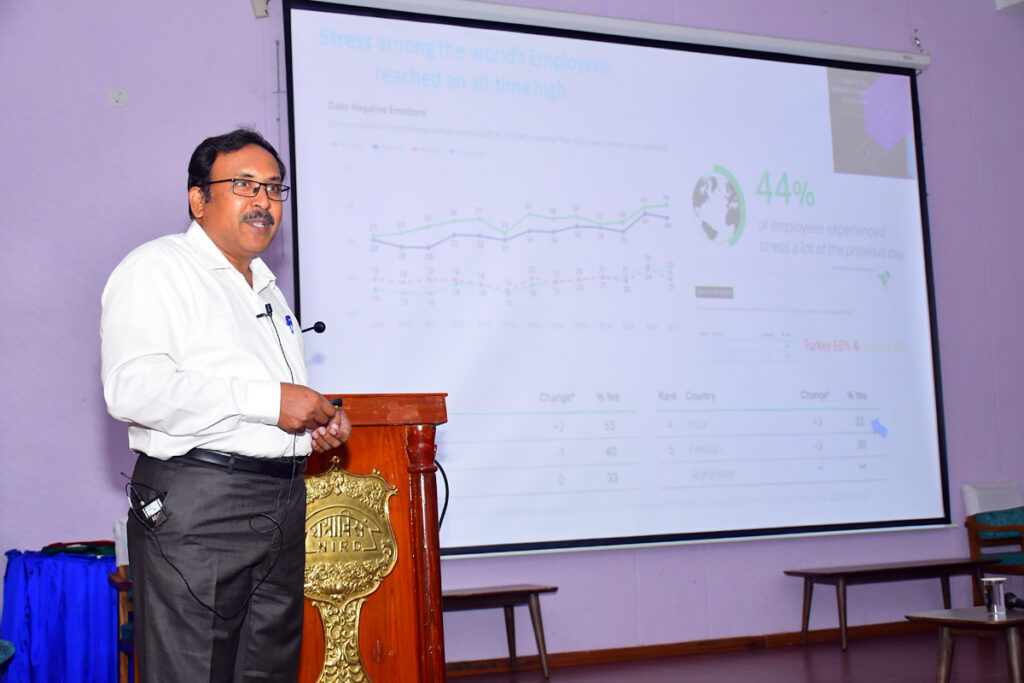
As part of the eminent lecture series, Dr. B. Uday Kumar Reddy, Yoga teacher, delivered a lecture on ‘Stress Management – Effective Interventions’ on 20th February 2023 in NIRDPR. Dr. M. Srikanth, Registrar and Director (Admin) introduced the speaker to the audience and also gave a welcome address. Dr. B. Uday Kumar Reddy spoke at length about stress and its implications on mental health and physical health. He pointed out that stress-related disorders are costing around 47 trillion US dollars as far as the global economy is concerned.
Dr. Uday further presented a few reports released by international agencies on the impact of stress on the working population. Detailing stress control measures, he demonstrated a set of physical exercises to be performed in the early hours of the day to counter stress. This was followed by a Q& A session.
Dr. M. Srikanth honoured Dr. Uday Kumar Reddy with a memento and Shri Manoj Kumar, AR (E), NIRDPR proposed a vote of thanks.
Lecture on 75 years of Rural Development
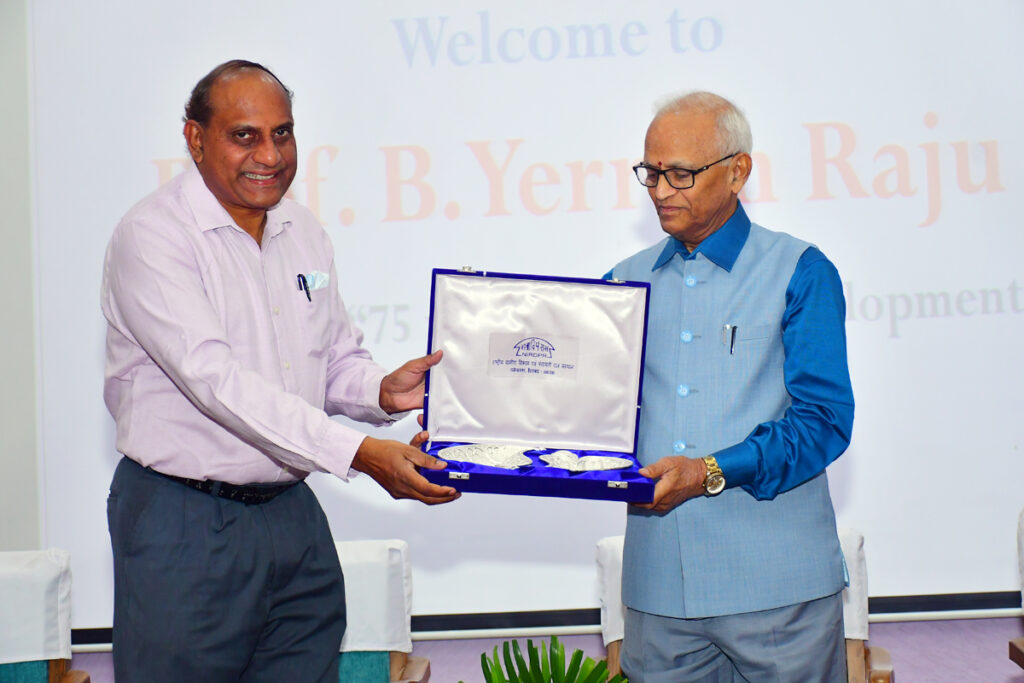
As part of the eminent lecture series Prof. B. Yerram Raju, Adviser to the Federation of Telangana Chamber of Commerce and Industry (FTCCI), delivered a lecture on the 75 years of Rural Development.
Dr. M. Srikanth, Registrar, Director (Admin), NIRDPR welcomed the Guest Speaker and Dr. G. Narendra Kumar, IAS, Director General, NIRDPR delivered the keynote address. The DG said that even after 75 years of independence we do not have rural development policy and NIRDPR is working towards developing one. He said that M. K. Gandhi has professed ‘Rural Industrialisation’ which is yet to be achieved.
Prof. B. Yerram Raju said that India has made giant strides in terms of rural development. There is an evolution from a bullock cart to an electric car in 75 years. The path for rural development was laid from the 2nd Development plan, there are many factors which influenced rural development like institutional promotion, community development, impact of LPG and Digitalisation direct payments policy. He went on to explain the funds allocated and the schemes introduced. A detailed view of rural development was given based on the five-year plans. The vote of thanks was delivered by Shri Manoj Kumar, AR(E), NIRDPR.
ToT Programme on Entrepreneurship & Sustainable Livelihood Models for Rural Communities
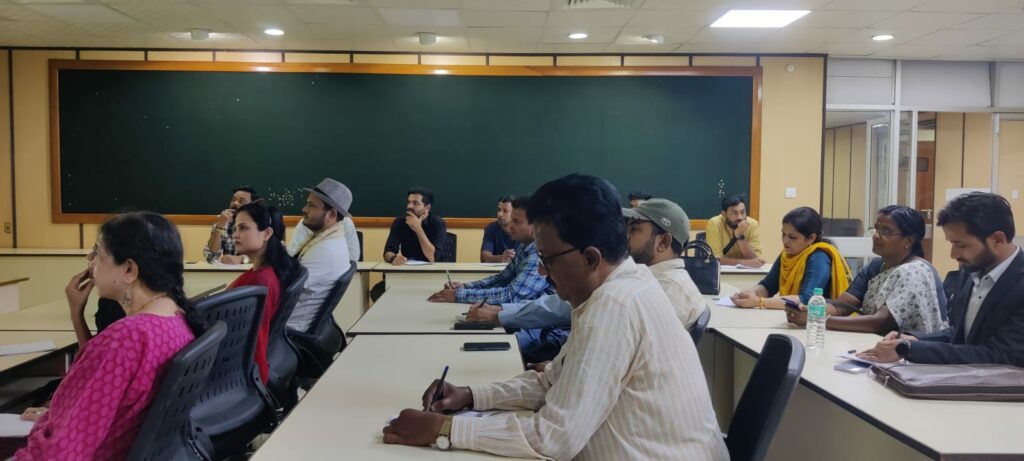
The Centre for Entrepreneurship Development and Financial Inclusion (CEDFI) in collaboration with the Centre for Innovations and Appropriate Technology for Skills and Jobs (CIAT &SJ) at the National Institute of Rural Development and Panchayati Raj, Hyderabad organised a five-day training programme on ‘Entrepreneurship and Sustainable Livelihood Models for Rural Communities’ from 13th to 17th February 2023.
Rural communities have a long history of sustainable living, but they must also empower themselves by leveraging their skills to build better and multiple livelihood models. The best solution to achieve this goal is by creating entrepreneurs at the grassroots level or fostering a better ecosystem for their growth.
Rural entrepreneurship is widely viewed as a critical solution to many problems, such as poverty, migration, unemployment, and inadequate education in rural communities. Rural entrepreneurs have the potential to drive change and develop successful models of sustainable livelihood, providing appropriate solutions to existing and emerging issues and concerns. With more than half of the country’s population residing in rural settlements, promoting rural entrepreneurship becomes increasingly important. Both Central and State governments are dedicating resources and efforts to support entrepreneurship activities in rural areas through programmes such as the Rural Self Employment Training Institutes (RSETIs), programmes under MoRD (GoI), State governments, and nationalised banks, the Startup Village Entrepreneurship Program (SVEP) under DAY-NRLM. In addition, there are a series of schemes and programmes of other ministries, including Ministries of MSME, MSDE, MoSJE, MoTA and so on. These programmes and schemes aim to mobilise, skill, and encourage rural youth and women to embrace entrepreneurship. However, the success of each programme will largely depend on their long-term accomplishments and impact on the ground.
This training programme aimed to provide concrete knowledge of entrepreneurship and sustainable livelihood to participants working at the grassroots level. It also aimed to facilitate networking opportunities for participants to exchange ideas and experiences and nudge new growth stories.

The programme had 23 participants from 10 States, namely Karnataka, Madhya Pradesh, Maharashtra, Tamil Nadu, Himachal Pradesh, Bihar, Gujarat, Manipur, Rajasthan, and Haryana. Participants were from diverse backgrounds, including faculty and directors of RSETI, young professionals of the State Rural Livelihood Mission, NGO representatives, CSR representatives, faculty of technical institutes, scientists of KVK, and fellows of the MGNF programme.
During this five-day programme, participants were introduced to developments in rural entrepreneurship, factors contributing to the growth of entrepreneurs, and problems and opportunities in government programmes. Extensive discussions were held on a variety of topics, including inclusive and sustainable rural enterprise development, promoting entrepreneurship through rural technology parks, designing entrepreneurial opportunities for rural India, mainstreaming gender in rural entrepreneurship and livelihood, NRLM: entrepreneurial avenues in farm and non-farm sectors, formulation of business plans, packaging and various techniques for safer storage and marketing of products produced and marketed by SHGs or rural small enterprises, technology, innovation and progress as an opportunity for rural entrepreneurs, value chain analysis, opportunities and challenges, collectives and aggregation models: case of FPOs, skilling strategies towards sustainable rural enterprise development, financial inclusion, financial literacy, and entrepreneurship: going digital, empowering entrepreneurship and sustainable livelihood through psycho-social development.

The sessions were organised to provide maximum opportunity for participants to raise concerns, flag up and propose ideas on the subjects of discussion, which broadened the scope of the topics and contributed to a better understanding. Pre and post-tests were conducted to measure the impact of the training programme on the participants’ learning outcomes.
To facilitate interaction with rural entrepreneurs, the programme introduced participants to technological interventions for entrepreneurship and provided orientation about incubation centres. Exposure visits to the Rural Technology Park (RTP) and the National Academy of Agricultural Research Management (NAARM) were organised. At the Rural Technology Park, live demonstrations of various technologies were arranged for the participants. These technologies could be replicated in other parts of the country through technology transfer and capacity building.
The facilities visited included the Vermicompost Unit, Gandhi Handmade Paper Unit, Leaf Plate Making Unit, Red Clay Brick Making Unit, models of cost-effective rural housing technologies, and others. Participants also had one-to-one discussions with entrepreneurs at RTP who operate stalls of numerous products such as herbal products, organic fertilisers, aromatic products, honey products, handmade household products, gems and jewellery, handmade snacks, and more. This visit not only helped participants learn about the work being done at the RTP but also introduced them to potential areas and fields where they could take action in their respective organisations and regions.
During the visit to the National Academy of Agricultural Research Management (NAARM), the participants were oriented with the concepts of the incubation centre and how an agriculture-based incubation works at NAARM. They also got the opportunity to converse with the budding entrepreneurs. In an interactive session, the CEO of a-IDEA (Incubation centre at NAARM) thoroughly explained the journey of a startup and also encouraged the participants to engage in the activities of a-IDEA and help budding entrepreneurs in their region who are looking for an opportunity. After the session, the participants met the founders of two startups, Link Organics and Farm Sathi, which are incubated at a-IDEA and work with farmer communities in organic farming and farm mechanisation, respectively. Finally, they submitted a learning outcome report of the exposure visit.
The five-day training programme was successfully completed due to the active engagement of participants and trainers. The programme taught tools and methods to encourage young people in rural areas to embark on entrepreneurial journeys. It provided a broad understanding of business, finance, and entrepreneurship, and raised awareness about gender and empowerment. The programme also touched on tools that will help rural entrepreneurs to innovate and solve grassroots problems. Participants provided detailed feedback on the online Training Management Portal, and received certificates upon completion of the programme. They also shared their experiences and provided suggestions for improvement in subsequent training programmes. Based on feedback from participants and resource persons, the programme was deemed satisfactory in all respects, and its objectives and goals were achieved. Dr. Partha Pratim Sahu, Associate Prof., CEDFI and Dr. Ramesh Sakthivel, Associate Prof. & Head, CSR, PPP, NIRDPR coordinated the training programme.
(Note: This report is prepared by two participants of the said programme, Ms. Sakshi Tekam and Mr. Pushpendra Chourdiya with inputs from Dr. Partha Pratim Sahu)
ToT Programme on GIS-based Planning and Monitoring of MGNREGA Works at GP Level using Yuktdhara

Centre for Geoinformatics Applications in Rural Development (CGARD), National Institute of Rural Development and Panchayati Raj (NIRDPR) organised a three-day training of trainers programme on ‘GIS-based Planning and Monitoring of MGNREGA Works at Gram Panchayat level using Yuktdhara’ in two batches, i.e., Batch-1: from Feb 27th to March 01st, 2023 and Batch-2: from 02nd to 04th March 2023 in collaboration with State Institute of Rural Development & Panchayati Raj (SIRD&PR) Gujarat. This was sponsored by MGNREGS under the Annual Action Plan of NIRDPR, Hyderabad.
The programme was inaugurated by Dr. M. V. Ravibabu, Associate Professor & Head (i/c), Centre for Information and Communication Technology, NIRDPR and Programme Director. He emphasised that the training programme was designed to introduce and provide working knowledge and skills on basic concepts, tools and technologies for planning and monitoring of NRM works under MGNREGA at the Gram Panchayat level using Yuktdhara Portal.
The use of GIS-based technology would help to improve the standard of governance with utmost transparency in the Gram Panchayats and also greatly aid in planning, monitoring, and data collection. He added that training the functionaries is a crucial aspect that helps to keep them up-to-date on the latest technological advancements. He also emphasised the goals of the three-day workshop, including concepts of Geoinformatics and its possible applications in planning and monitoring, introduction to Bhuvan Yuktdhara portal, developing working skills on analysing the GIS data layers for planning and monitoring of Mahatma Gandhi NREGA at GP level, mobile applications for asset mapping, analysing the GIS data layers for planning and the preparation of various assets.
Shri Dhaval Parik, GIS Engineering and Local Coordinator, SIRD&PR, Gujarat outlined the key points of using GIS-based tools in the spatial planning using Yuktadhara portal and hands-on practical approach on landscape formalisation, identification drainage line treatment, map composition preparation of planes; field data collection using mobile based applications. A total of 76 (Batch-1: 42 and Batch-2: 34) officials from Rural Development and Panchayati Raj (RD&PR) department functionaries attended the training programme.

The programme consists of field visits for data collection using mobile GNSS. All participants were divided into multiple teams and they collected various assets such as trees, electric and telephone poles, buildings, etc., in the form of vector features, i.e., point, line and polygon. While collecting data from the field, participants visualised and experienced the field conditions and geo-tagging accuracy aspects, the same was uploaded into Yuktadhara in suitable formats.
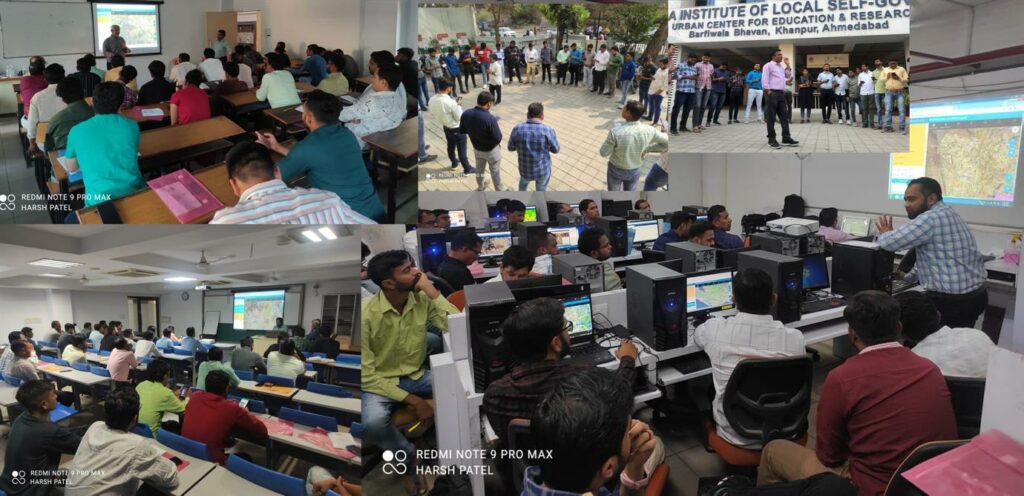
In the concluding session, the NIRDPR course team congratulated all the participants, collected their feedback and awarded the certificates. Shri Dhaval Parik expressed his gratitude to NIRDPR for imparting the training for the RD&PR functionaries.
The programme was a success, as per the feedback received from the participants on Yuktadhara portal for both roles of MSE and GAS to improve further before officially launching the same. All participants felt that the training programme was useful to prepare reports for planning and monitoring various works under MGNREGA at the GP level in the form of spatial planning. The training programme was coordinated by Dr. M. V. Ravibabu, Associate Professor & Head (i/c) CICT and Course Director, Shri Dhaval Parik, GIS Engineer, SIRD&PR, Gujarat and Shri Md. Abdul Moid, Training Manager, CGARD.
National Workshop on Development of a Framework for Linking Corporates to Strengthen SHG-led Entrepreneurship Development

The National Institute of Rural Development and Panchayati Raj, Delhi Branch (Centre for Corporate Social Responsibility Public Private Partnership and Peoples Action and National Rural Livelihoods Mission- Resource Cell) organised a national workshop on ‘Development of A Framework for Linking Corporates to Strengthen SHG-led Entrepreneurship Development’ from 8th to 9th February 2023. Nearly 60 stakeholders from government, international development bodies, PSUs and corporates engaged in a face-to-face discussion to develop the framework for linking SHGs to corporates.
The workshop was inaugurated by Shri Shailesh Kumar Singh, Secretary, Ministry of Rural Development, Government of India. He underlined the importance of developing women entrepreneurs and SHG-led enterprises for the larger goal of rural development and elimination of poverty in all its forms.
The inaugural gathering was also addressed by Shri Charanjit Singh, Additional Secretary (RL), Shri Raghvendra Pratap Singh, Director, NRLM and Shri Shashi Bhushan, Deputy Director General i/c, NIRDPR. Shri Charanjit Singh noted that the NRLM has entered its third phase with the enterprise development goal after the registration of women, and completion of bank linkages and formal micro-credit, adding that connecting to new markets is now important for sustaining the enterprises.

The technical panels included experts from the development sector such as Bill and Melinda Gates Foundation, Institute of Social Studies Trust, IWWAGE-IFMR, World Association of Small and Medium Enterprises, Indian Institute of Corporate Affairs, S M Sehgal Foundation, Tata Trust and corporates such as Jubilant Ingrevia, and FDRVC. Dr. Ashish Kumar Goel, Additional Secretary-Rural Development, Ministry of Rural Development chaired the technical sessions discussing the background and existing cases for Corporate SHG linkages in the States. Dr. Goel emphasised the need to ensure that the growth of income of the enterprises progressively translates into the growth of income of the women entrepreneurs, who will be connected to the enterprise through the supply and distribution channels.
The workshop took note of the extensive work of the National Rural Livelihood Mission (NRLM) of Ministry of Rural Development which has created nearly 78 lakh SHGs (27 per cent pre-NRLM) with a registration of more than eight crore women across India. There was a consensus that the next stage of NRLM should connect rural women to diverse value chains and distribution channels, therefore, increased impetus should be given to mainstreaming rural SHG-led enterprises in the overall plan for livelihood creation. Both backward and forward linkages and networks are equally important.
Going forward, the entire value chain from farm/non-farm to consumer will be analysed to have an industry-specific mapping of entry points for rural women, skill gaps and required policy changes. It is widely felt need that SHG women require strong capacity to build a brand for their products through proper quality management, packaging and meaningful business networking. There is also a need for the SHGs to have strong financial literacy to be able to run the enterprises independently. The creation of a specific human resource to manage business and finances for the SHG-led enterprises within the SRLM will be required to intensify entrepreneurship development. The workshop strongly advocated collecting relevant data for capturing the SHG-led enterprise development to scientifically monitor and evaluate the growth and performance of the SHGs. It was proposed that an index to quantify women’s entrepreneurship development should be identified and measured for capturing the performance of SHG-led enterprises across India.
The workshop was coordinated by Dr. Ruchira Bhattacharya, Dr. Radhika Rani, Dr. Ramesh Sakhtivel and Shri Chiranji Lal from NIRDPR Delhi Branch and NRLM-RC.
ToT on Capacity Building programme on e-GramSwaraj Portal for PRI Functionaries
The Centre for Good Governance and Policy Analysis (CGG&PA), National Institute of Rural Development and Panchayati Raj organised a series of Training of Trainers (ToTs) on ‘Capacity Building programme on e-GramSwaraj Portal for PRI Functionaries.’ The ToT programmes were organised at SIRD&PR, Tamil Nadu from 31st Jan to 3rd Feb 2023, at SIRD, Srinagar 6th to 9th Feb 2023 and at SIRD, Manipur from 14th -17th February 2023. These programmes were sponsored by the Ministry of Panchayat Raj, Government of India.
SIRDPR, Tamil Nadu

The programme was inaugurated by Dr. Arput Raj, Head, Center for CCNRM, SIRD&PR, Tamil Nadu. Highlighting the significance of uploading the Gram Panchayat Plan in the GPDP portal and eGramSwaraj Portal, he emphasised the latest developments in planning the GPDP with a special focus on rolling out the SDG goals and themes to be included in the planning of activities in Gram Panchayat. A total of 26 district in-charges and Block Development Officers participated in this programme. Shri K. Rajeshwar, Programme Director, welcomed the participants and briefed the objectives of the training programme. Mr. Suresh Kumar, faculty, coordinated this training programme.
SIRD, Srinagar
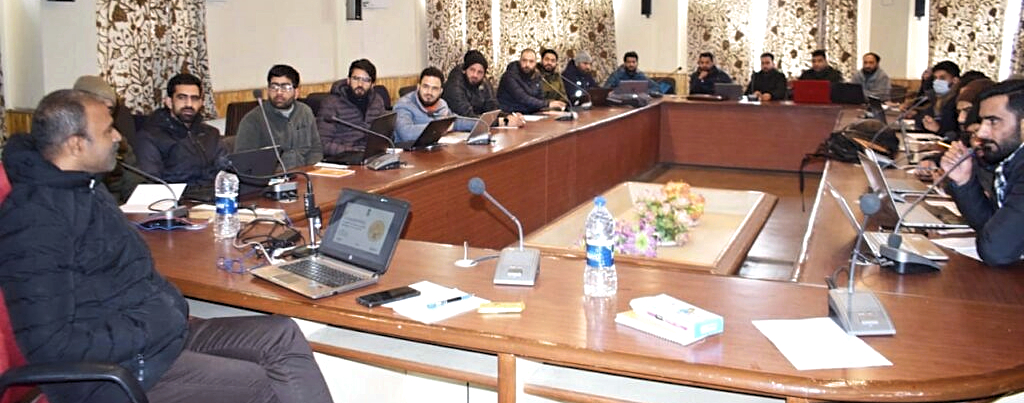
The programme aimed to integrate the skills and knowledge of the latest developments of the e-GramSwaraj portal. It focused on the technical issues and challenges in all modules of the portal very elaborately. Mr. Afzal, State Nodal Officer, interacted with the participants and highlighted the importance of Gram Panchayat plan uploading in the GPDP portal and eGramSwaraj Portal. He also emphasised the latest developments in planning the GPDP with a special focus on rolling out the SDG goals and themes to be included in the planning of activities in Gram Panchayat. Ms. Navamini, Under Secretary, Department of Panchayati Raj, J&K monitored the training programme and interacted with the participants. Dr. B. A. Kumar, Associate Professor, coordinated the programme. A total of 33 State level officials, Block Development Officers and District In-charges participated in this programme.
SIRD, Manipur

The programme was inaugurated by Dr. Th. Mitrajit Singh, Principal of SIRD. He interacted with the participants and highlighted the importance of uploading Gram Panchayat plan on the GPDP and eGramSwaraj portals. During his interaction, he monitored the reports of the GP profile in the eGramSwaraj Portal and found that none of the GP profiles were updated. During the training programme, the GP profile was demonstrated and the participants successfully updated the data on the eGramSwaraj portal. A total of 40 PRI functionaries participated in this programme. Mr. Dilip Kumar coordinated this programme.
In addition to this, all the ToTs had sessions on the Panchayat profile, planning module integration with Sanklap Siddi for a vibrant Gram Sabha, progress and financial reporting by highlighting the significance of PFMS on 15 Finance Commission grants and Gram Manchitra with a focus on planning. All the sessions were demonstrative and showcased how to handle the demo portal and monitoring reports in the live portal.
The training methods of the course were delivered through a participatory learning process. The sessions were dynamic and included introductory presentations, interactive sessions, lectures, documentary presentations, brainstorming and practical exercises, etc.
A post-training evaluation was conducted and the participants of the three programmes submitted feedback online. Shri K. Rajeshwar, Course Coordinator delivered the valedictory address. All the participants were impressed with the programme design, contents, programme deliveries and hospitality arrangements and they appreciated it. All three ToT programmes were conducted by Shri K. Rajeshwar, Assistant Professor, Centre for Good Governance and Policy Analysis (CGG&PA).
Capacity building on Millet Marketing at SARAS Mela by NIRDPR

National Institute of Rural Development and Panchayati Raj, Delhi Branch organised a workshop on ‘Opportunities and Challenges for Marketing Millets through SHGs’ during the Saras Ajeevika fair organised at Noida Haat on 2nd February 2023.
The Ministry of Rural Development has been promoting millet marketing and consumption. There are around 13 different crops, which are now collectively called millets. Some of the common millets are maize, ragi, bajra, kutu, etc. Earlier, these were used by indigenous people. It is generally seen that people having a good intake of millets are having a stronger immune system.
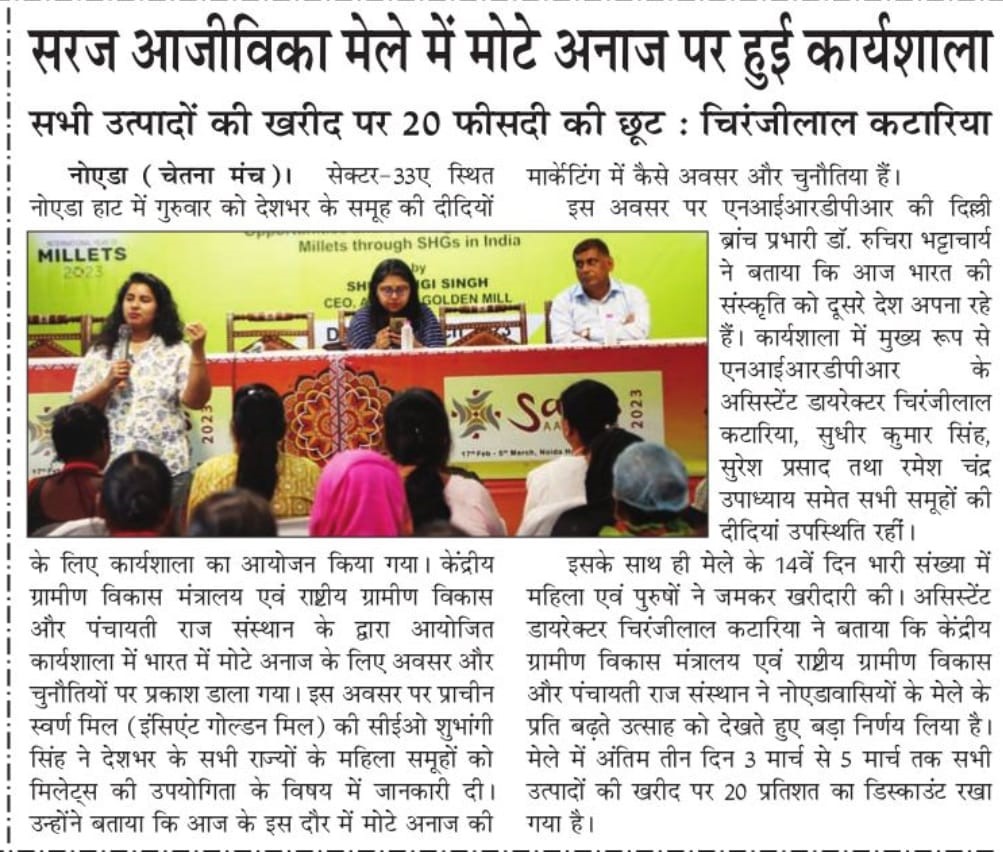
NIRDPR organised the workshop with the objectives of discussing strategies of millet marketing through SHGs, seeking new opportunities in the sector of millets for the SHGs, and identifying solutions to some of the challenges in millet marketing.
There are multiple opportunities in this sector, which need to be promoted. The millet value chain has to be defined and infrastructure and skill gaps have to be identified.
The workshop invited Smt. Shubhangi Singh, CEO of a millet start-up the Ancient Golden Mill for sharing her insights on millet value addition, branding and marketing. Around 50 women SHG members and their State Coordinators from SRLMs joined the workshop.
Dr. Ruchira Bhattacharya and Shri Chiranji Lal from NIRDPR Delhi Branch coordinated the workshop with sponsorship from the NRLM Division, Ministry of Rural Development.
CDC, NIRDPR Organises Two-day Book Fair

The Library section of the Centre for Development Documentation and Communication (CDC), National Institute of Rural Development and Panchayati Raj (NIRDPR) organised a two-day book fair on 27th and 28th February 2023 at Dr. B. R. Ambedkar Building on the campus. Shri Shashi Bhushan, Deputy Director General (i/c), NIRDPR inaugurated the book fair in the presence of Dr. Jyothis Sathyapalan, Prof. and Head, CDC. Many including academic and non-academic members attended the inaugural event.

The event was organised with the objective of selecting books for the Institute’s library. Publishers and distributors from in and around Hyderabad including, SAGE, Orient Blackswan, Book Syndicate, Mind Bookstore and others took part in the fair. The book fair was coordinated by Shri Sudhakar, Asst. Librarian and Dr. Umesha M.L., Asst. Librarian, CDC, NIRDPR.
